Edie Melson's Blog, page 47
July 2, 2024
Five Tips to Develop Your Writing Skills

by Sarah Sally Hamer @SarahSallyHamer
Every writer started somewhere.
Well, let me rephrase.
There may be one or two people in the universe who were amazing, best-selling writers when they were born. But I honestly can't name you even one. All of those "over-night successes" probably had been writing for years, if not decades, before someone finally saw their brilliance, because over-night really doesn't happen all that often.
What is much more common is writers who write and hone their skills, developing themselves story by story, learning their craft and morphing into an amazing writer.
What's the best way to do that? Here are five tips:
1. Write. Often. A lot. I had a student years ago who told me that he wasn't going to write at all until he learned everything he needed to write perfectly. I totally disagree with that philosophy. Practice. Practice. Practice. It's the best way I know of for sure to help you learn. What practice really does is allows you to find your voice. When I first started writing for profit (as such!), I wrote like my favorite writers did. I mimicked their phrasing, their pacing, their style. It was meant as a compliment but it covered up my own voice, and I almost lost it. But I finally found who I was and how I wrote. Think about your favorite author's books. Once you've read a couple, you'd recognize their voice in almost any book. (In fact, J. K. Rowling was discovered to be author Robert Galbraith by her linguistic fingerprint – some of her books were scanned by a software program that searches for similar characteristics and found her fingerprint to match with Galbraith's. When asked about it, she confessed.) Bottom line, the practice of writing can help you to find your own fingerprint and use it for success. I think Jo Rowling wanted to branch out and was "caught" doing it her strong voice certainly helps build a readership.2. Read craft books. A lot of really good writers have explained their processes, helping newbies and experienced writers alike. Thank goodness! We all can improve our writing, no matter how many books we write. I suggest that, instead of buying every craft book out there, although my friends think that's what I've tried to do, find four or five that resonate with your weaknesses. I have an amazing library of craft books but find I only use a few of them very often. One of my favorites is about character building, another about setting scenes. I also have one about how structure and theme work hand-in-hand. I'll put a couple of them in the comments below. What are your favorite craft books?3. Craft books are a good start but I highly recommend you also read books of all kinds. The more the better. A depth of knowledge of how different genres work helps immensely to broaden your own writing. For instance, almost every genre ever written has some sort of a relationship—romantic love or not—between characters. So, even if you never plan on writing a romance, understanding how romances work can add to your own tool box. Almost every book also has a mystery. It doesn't have to be a murder in your own story, but we always want our readers to wonder what's going to happen next. Seeing how a mystery or suspense writer puts clues in the story can help you to keep your audience guessing.4. Get help. I don't usually recommend critique groups, even though I've been involved with two or three strong, helpful, encouraging, wonderful groups. I've also had experiences with soul-sucking writers who are willing to destroy you. So, if you decide you need help, you might want to take a few writing classes, whether local or online, and see if you connect with anyone. Several of my own students have found a critique partner in class. And sometimes those people become good friends. 5. Never stop learning. I pulled a ten-year-old manuscript out from under my bed last year and asked a friend/critique partner to look at it. She read all the way through, marking what she saw needed work, and handed it to me. It was VERY red with all the corrections and edits. She said, "You've improved your writing a lot in the last decade." I had to laugh. She was right in everything she marked. And I'm glad I have worked on being a better writer over my writing life and that she noticed it.
At the end of the day, we all can make our writing better by taking a class or reading a craft book or finding a good critique. I promise you, it's very worth it.
TWEETABLEFive Tips to Develop Your Writing Skills from @SarahSallyHamer on @EdieMelson (Click to Tweet)
 Sarah (Sally) Hamer, B.S., MLA, is a lover of books, a teacher of writers, and a believer in a good story. Most of all, she is eternally fascinated by people and how they 'tick'. She’s passionate about helping people tell their own stories and has won awards at both local and national levels, including two Golden Heart finals.
Sarah (Sally) Hamer, B.S., MLA, is a lover of books, a teacher of writers, and a believer in a good story. Most of all, she is eternally fascinated by people and how they 'tick'. She’s passionate about helping people tell their own stories and has won awards at both local and national levels, including two Golden Heart finals.A teacher of memoir, beginning and advanced creative fiction writing, and screenwriting at Louisiana State University in Shreveport for over twenty years, she also teaches online for Margie Lawson at www.margielawson.com. Sally is a free-lance editor and book coach, with many of her students and clients becoming successful, award-winning authors.
You can find her at info@mindpotential.org
Published on July 02, 2024 22:00
July 1, 2024
Get Yourself A Good Writers Group

by PeggySue Wells @PeggySueWells
“Are you part of a writers group?”
A local writer and I sat on my front porch while she interviewed me about my recent release, What To Do When You Don’t Know What To Say. The question immediately brought memories of being new in town.
When I attended a meeting someone had recommended, the competition and criticism in the group quickly triggered a migraine. The following month, my daughter, also a writer, came along. That migraine was worse than the first and we agreed I was not a fit for this circle of wordsmiths.
“No,” I told the reporter. “I prefer to find ways to move forward rather than be critical of one another. You?”
“Me neither,” she replied. “I’m not competitive.”
We sipped our tea, studied the lilac bush, and pretended we were not both considering the same idea.
At last, she boldly broke the silence. “Would you like to meet and talk about our writing?”
“Only if we encourage one another to be our best.”
“Agreed.” On her notebook, she jotted down the date we set.
That was 30 years ago. Not even kidding. Even Debbie and I cannot fathom how long we’ve been meeting, nor could we have guessed how much we would do life together beyond our monthly gathering to talk shop.
Many writers of various skill levels have been seasonal parts of our group. People attend and receive support while writing a project, and then move on to other interests. A handful of us are core members who continue to craft words on manuscripts. Debbie’s first novel won a Christy Award. I have 40 books with my name on them and have collaborated on that many more.
In three decades, our core group has been together through proposal rejections, a collection of agents and publishers, book contracts, relocations, babies, graduations, divorces, marriages, grandbabies, surgeries, and funerals. Life, love, and faith have left their mark on our hearts and writing.
And we’ve honed a few traditions that have made our writers group work and keep working so well that authors travel a couple of hours to attend.
One Writing Group's Traditions & GuidelinesCome for any amount of time you can be with us.If you come late, we are thrilled you made it. If you must leave early, let us know so we make sure you get feedback on your project before you leave.You don’t have to tell anyone if you are coming or not. But if it is convenient to let someone know you won’t make it this month, we care.You do not have to bring snacks. But if you do, we will eat it.Do not take time from writing to bake or shop for snacks. If something jumps into your cart on a regular shopping trip or falls out of the refrigerator on your way to group, we will eat it.You have a time slot during the meeting. We will give feedback on anything you read aloud, brainstorm on any question, problem-solve, and network to help you move forward. We will grieve with you over hard things and celebrate your successes.We mostly meet in someone’s home so we can hear better and speak freely. What is said at writers group remains in writers group.When the meeting ends, anyone is invited to go out to dinner where we can talk more about writing.
Everyone writes something different from fiction to nonfiction, children’s, middle-grade, young adult, and grown-up stuff. Authors have penned memoirs, devotions, fantasy, westerns, rom-com, thrillers, suspense, greeting cards, musicals, and screenplays.
The group quickly became a safe place to bring good writing, messy manuscripts, and half-baked ideas. We laugh and cry together, and as each has become a better writer, we’ve grown together. When Unnatural Cause was complete, the writers group correctly noticed that my initial chapter one was actually chapter two. The final chapter penned in that novel was chapter one thanks to these fellow writers wanting my work to be its best.
When looking for a writers group or forming one yourself, the most important aspect is that participants leave feeling more encouraged than when they arrived. If attending a writers group gives you a migraine, find a better fit.
TWEETABLEGet Yourself A Good Writers Group from @PeggySueWells on @EdieMelson (Click to Tweet)
 PeggySue Wells is the bestselling author of 40 books and collaborator of many more. Action and adventure, romantic suspense, military romance, and cozy mystery are the page-turning novels by P.S. Wells, including Homeless for the Holidays, Chasing Sunrise, The Patent, and Unnatural Cause. How to live better, easier, and simpler is the focus of her nonfiction including The Ten Best Decisions A Single Mom Can Make. Founder of SingleMomCircle.com, PeggySue coaches writing and speaks at events and conferences. When not writing, she parasails, skydives, snorkels, scuba dives, rides horses, and has taken (but not passed) pilot training. Connect with her at www.PeggySueWells.com, on Facebook at PeggySue Wells, and LinkedIn at linkedin.com/in/peggysuewells
PeggySue Wells is the bestselling author of 40 books and collaborator of many more. Action and adventure, romantic suspense, military romance, and cozy mystery are the page-turning novels by P.S. Wells, including Homeless for the Holidays, Chasing Sunrise, The Patent, and Unnatural Cause. How to live better, easier, and simpler is the focus of her nonfiction including The Ten Best Decisions A Single Mom Can Make. Founder of SingleMomCircle.com, PeggySue coaches writing and speaks at events and conferences. When not writing, she parasails, skydives, snorkels, scuba dives, rides horses, and has taken (but not passed) pilot training. Connect with her at www.PeggySueWells.com, on Facebook at PeggySue Wells, and LinkedIn at linkedin.com/in/peggysuewells
Published on July 01, 2024 22:00
June 30, 2024
Organize Your Writing Life: Goal Setting and 10 Overall Organization Tips

by Edie Melson @EdieMelson
I'm starting a new series here on the blog. I'm going to share what I've learned from other writers and my own experiences about writing organization. I'm going to cover the big-picture stuff and the nit-picky details of day-to-day organization. I hope you find a few tips to help and—most of all—I hope you'll chime in with the things you've picked up that help you!
Goal Setting and 10 Overall Organization Tips
1. Take a look at your goals. It’s important to have goals—and it’s important to have written goals. It’s easy to just float along, taking things as they come. But when we do that, it’s hard to make progress—and it’s even harder to evaluate progress. Beyond that, there’s something almost magical about writing down your goals. Having them recorded somewhere gives them weight and makes it easier to make them a priority.
2. Evaluate how much time you’re spending on social media. If it’s more than thirty minutes a day, it’s time to re-evaluate. After thirty minutes, your return on investment takes a severe nosedive in the downward direction.
3. Let go of your expectations. No this isn’t a contradiction of #1 above. There is a huge difference between goals and expectations. I bet if you’re honest with yourself you have quite a few expectations—from what you expect from yourself, to what you expect from others. For me, when I took a hard look, a lot of those expectations were totally unreasonable. So spend some time and take a hard look at your expectations. The ones that are reasonable, make into goals and priorities. The rest of them . . . well . . . just throw them away.
4. Determine when, in a 24-hour period, you are most creative. Some of us are night people, some are morning people, and some of us work best in the afternoon. But we each have a specific time when the words and ideas tend to flow easier. Look at your internal clock and figure out when that time is. Then, guard it like you’re guarding gold. Really that’s what you’re doing. Our income and dreams are locked up tight with our ability to create. When we figure out the time that work best for creative work, it’s like someone has handed us pure gold.
5. Come up with a way to schedule your time. I know not everyone can have a detailed schedule. But truthfully, if you’re trying to carve out time to write (and who isn’t?), you need to schedule that time. There are lots of methods to help with time management from an old fashioned spread sheet to the Pomodoro Technique. Do some research and find something that works for you.
6. Commit to quit talking negative to and about yourself. When someone bashes our ability and/or our manuscript, it takes time to recover. The same holds true when we do it to ourselves.
7. Take care of yourself physically. This means getting enough sleep, eating well, and especially exercising. The sedentary lifestyle of a writer can quickly take its toll on us physically and mentally. Sure these things take time—often time we don’t feel we can spare. But even though this may seem counterintuitive, it will streamline your writing life. You can accomplish so much more when you are physically healthy and mentally alert.
8. Build in regular breaks. Especially when I’m on a deadline, I’ve found that taking regular breaks greatly improves my productivity. A good friend and spiritual mentor of mine Kent Pate has a saying, “Divert daily, withdraw weekly, abandon annually.”
9. Surround yourself with encouraging writers. You don’t just need encouraging friends, but also encouraging writers. We writers are an odd lot, and we need others around us who understand our thought process, our struggles and our quirky joys. These writers should be active and growing—not those who just talk about writing, but those who spend time writing.
10. Engage a prayer team. This may seem odd, especially if you’re fairly new to even calling yourself a writer, much less having something published. But the truth is, this life is hard. When we answer God’s call to step out and share His message, we’re going to encounter spiritual warfare. For that, you need people to pray for you. If you’re also building a ministry, trying to grow an income and/or beginning to speak, that’s even more of a reason to surround yourself with prayer. These folks don’t have to be writers, but they should have a connection to you.
These are my big-picture tips that I've found help me set myself up for success as a writer. I'd love hear your tips, too. Be sure to leave your thoughts in the comments section below.
TWEETABLEOrganize Your Writing Life: Goal Setting and 10 Overall Organization Tips from @EdieMelson (Click to Tweet)
 Edie Melson is a woman of faith with ink-stained fingers observing life through the lens of her camera. No matter whether she’s talking to writers, entrepreneurs, or readers, her first advice is always “Find your voice, live your story.” As an author, blogger, and speaker she’s encouraged and challenged audiences across the country and around the world. Her numerous books reflect her passion to help others develop the strength of their God-given gifts and apply them to their lives. Connect with her on her website, through Facebook, Twitter and on Instagram.
Edie Melson is a woman of faith with ink-stained fingers observing life through the lens of her camera. No matter whether she’s talking to writers, entrepreneurs, or readers, her first advice is always “Find your voice, live your story.” As an author, blogger, and speaker she’s encouraged and challenged audiences across the country and around the world. Her numerous books reflect her passion to help others develop the strength of their God-given gifts and apply them to their lives. Connect with her on her website, through Facebook, Twitter and on Instagram.
Published on June 30, 2024 22:00
June 29, 2024
When Failure Brings Blessings

by Edie Melson @EdieMelson
That is why, for Christ’s sake, I delight in weaknesses, in insults, in hardships, in persecutions, in difficulties. For when I am weak, then I am strong (2 Corinthians 12:10 NIV).
For me, failure reinforces and validates the fears I battle as a writer. Every mistake I make seems to add weight to the voices I hear in my head that feed my insecurity. And I make a lot of mistakes. Because this vicious cycle can bring my writing to a screeching halt, I’ve had to find a way to combat this way of looking at life.
One week I was overwhelmed with assignments—blog posts, articles, devotions, and even a book—all due in the same week. Although I’d love to say I was organized and everything went off without a hitch, it didn’t. The book I turned in had all my attention and the other assignments suffered. By the time Friday rolled around I felt like I’d been to war and back—finishing up wounded and weary. I’d been honest on social media about the craziness of the week and how I’d tried to make sure my work was typo-free and on time, but I’d fallen so short it was pathetic, and I knew it.
Truthfully, I felt like quitting that week. Everywhere I turned, the evidence of my failure was on view to the world. I couldn’t see how my less-than-stellar work was blessing anyone. The last straw was the blog post I’d published on my own site that morning. As I read it in the email that had been sent out I just shook my head. The typos and other mistakes seemed to prove my ineptitude.
That was the day the email arrived in my inbox.
A new writer shared that although it had taken all her courage to write me, my openness about my struggles and my doubts that week had given her the push she needed. She felt I’d understand her turmoil. She went on to say that the fact I’d fallen short of perfection was an encouragement and was keeping her from quitting on the call God had placed on her life.
She shared her struggles, and I finished the email with tears in my eyes. How like God to show me once again how He was at work through me, no matter how imperfect I was. He reminded me that I wasn’t the one who needed to be perfect. He has that covered—and in His perfection—He makes everything work together exactly as it should.
Now let me pray for you.
A Prayer When I Let Failure Make Me Doubt
And you must show mercy to those whose faith is wavering (Jude 1:22 NLT).
Dear Lord, I had such energy and hope when I first heard You whisper that I would be a writer. My imagination and dreams soared to all that calling would be. But now I’m no longer flying, instead I’m crawling through the mud of defeat and despair. Did I hear You wrong? Am I supposed to write for You or was it something I just made up?
Following You is all I’ve ever truly wanted. Help me grow into the person You designed me to be. Don’t let my expectations get in the way of hearing Your voice. Replace the false ones with the calling that allows me to be exactly who You made me to be.
Speak to me. Let me clearly hear what Your plan is for my life. I don’t feel like I’m getting anywhere with writing. I wonder how You could have called me to a place of failure.
Show me how You’ve spoken through my words. Let me see evidence that this calling was from You. Don’t let me deceive myself either way. I’m at a place where what I desire most is Your truth. There have been times when You’ve used my writing. I admit. But do those few times mean You meant me to be a writer? Clear out the confusion and replace it with the light of Your plan. Ensure that my heart’s desire lines up with all that You have in store for me. I trust You, and I trust the fact that You love me. Use me where I am, and open my eyes to see You at work. Amen.
*Content reprinted with permission from Soul Care for Writers, Bold Vision Books, Inc.
TWEETABLEWhen Failure Brings Blessings, @EdieMelson (Click to Tweet)
 Edie Melson is a woman of faith with ink-stained fingers observing life through the lens of her camera. She’s learned to embrace the ultimate contradiction of being an organized creative. As an author, blogger, and speaker she’s encouraged and challenged audiences across the country and around the world. Her numerous books reflect her passion to help others develop the strength of their God-given gifts and apply them to their lives, often using creativity to empower this connection. The Write Conversation, the blog she developed and manages, reaches thousands and has been on the Writer’s Digest Top 101 Sites for Writers since 2017. As a social media and blogging expert she’s worked with clients that range from authors and speakers to business and ministry leaders. She also knows the necessity of Soul Care and leads retreats, conferences & workshops around the world on staying connected to God. Her numerous books, including the award-winning Soul Care series reflect her passion to help others develop the strength of their God-given gifts. She’s the director of the Blue Ridge Mountains Christian Writers Conference and board member of the Advanced Writers and Speakers Association.
Edie Melson is a woman of faith with ink-stained fingers observing life through the lens of her camera. She’s learned to embrace the ultimate contradiction of being an organized creative. As an author, blogger, and speaker she’s encouraged and challenged audiences across the country and around the world. Her numerous books reflect her passion to help others develop the strength of their God-given gifts and apply them to their lives, often using creativity to empower this connection. The Write Conversation, the blog she developed and manages, reaches thousands and has been on the Writer’s Digest Top 101 Sites for Writers since 2017. As a social media and blogging expert she’s worked with clients that range from authors and speakers to business and ministry leaders. She also knows the necessity of Soul Care and leads retreats, conferences & workshops around the world on staying connected to God. Her numerous books, including the award-winning Soul Care series reflect her passion to help others develop the strength of their God-given gifts. She’s the director of the Blue Ridge Mountains Christian Writers Conference and board member of the Advanced Writers and Speakers Association.She and husband Kirk have been married 42+ years, and live near their three sons and three grandchildren in the foothills of the Blue Ridge Mountains. Edie and Kirk can often be found with their big black dog hiking—Edie hanging off ledges for the best camera angle and Kirk patiently carrying her tripod. Connect with her on her website, www.EdieMelson.com and through social media.
Published on June 29, 2024 22:00
June 28, 2024
3 Tips to Get Restarted After a Writing Conference
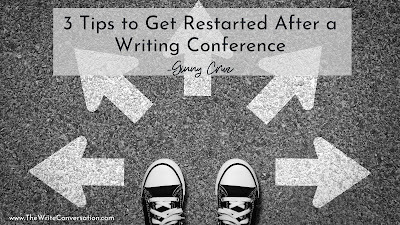
by Ginny Cruz, MPA, PT
Writers' conferences offer incredible opportunities for learning and networking. However, for introverted writers like most of us, the energy and social interactions can leave us drained. The challenge of restarting our writing after the conference can be particularly daunting.
Having attended several writers' conferences, including the incredible Blue Ridge Mountains Christian Writers Conference, I have learned a few ways to get restarted when I return home.
Here are some suggestions:
3 Tips to Restart Your Writing
1. Take time to rest. Writers’ conferences get me excited over new ideas yet burdened with doubts about my abilities. And, frustration that I'm not there yet, wherever “there” is. All those competing emotions tire me. After a conference, I enjoy reading, watching movies, and napping. You want to allow your mind to relax. Beware of the temptation to compare which can cripple some of us to the point we put the writing down and never pick it up again. Do not let that be you. 2. Ask God to reveal your next writing move. All the new information you receive at the conference can cause writer's block. Pray for God to direct your next move. Wait for a sense of purpose and a renewal of energy towards what God reveals. You must care deeply about your readers' needs in order to put in the work to write for them. I often find some projects need shelving for a time.3. Accept that you need pruning. Matthew 15:2 NIV states, “He cuts off every branch in me that bears no fruit, while every branch that does bear fruit he prunes so that it will be even more fruitful.” God may lop off some of your favorite projects in order for your writing to bear the best fruit. He may trim good things that sap your creativity. On my journey, He has closed publishing doors in order to aim me toward the correct opportunity. He has made me wait longer than I wanted to deepen my trust in His timing. He has slowly revealed who my readers are and what they need from me. He must do the same with you. For your writing to serve His purpose, you must allow Him to prune so your fruit nourishes your readers.
Are you struggling to get back to writing after your conference? I have been there, too. God has the answers you need. After you nap for a few days, maybe write something for fun. Reorganize your projects so you can focus on what truly matters to you. And take time to grieve those closed doors and the pain of things not going as you planned. Growing pains are unpleasant. No one longs for pruning and disappointment. However, writing for God means our voice must convey life’s realities. And real life includes undesirable experiences. It is okay if it takes time to restart your writing, but please begin somewhere.
What are some ways you get restarted after a conference? Be sure to leave your thoughts in the comments section below!
TWEETABLE3 Tips to Get Restarted after a Writing Conference from Ginny Cruz on @EdieMelson (Click to Tweet)
 Ginny Cruz, MPA, PT is a pediatric physical therapist, early intervention specialist, and award-winning author. Her writing encourages and teaches moms simple and effective ways to help their baby meet developmental milestones. In addition to writing, she enjoys hiking, reading, and camping with her husband. Find out more at ginnycruz.com, Instagram, or Facebook.
Ginny Cruz, MPA, PT is a pediatric physical therapist, early intervention specialist, and award-winning author. Her writing encourages and teaches moms simple and effective ways to help their baby meet developmental milestones. In addition to writing, she enjoys hiking, reading, and camping with her husband. Find out more at ginnycruz.com, Instagram, or Facebook.
Published on June 28, 2024 22:00
June 27, 2024
5 Favorite Smart Phone Apps for Writers

by Lori Hatcher
Guess how many smart phone apps you can find in the Apple App Store?
If you guessed 3,835,661, you’re right. Mind boggling, isn’t it?
The invention of the smart phone and the creation of “apps,” short for “applications,” has transformed our lives. We use them to listen to our Bible, order dinner, and schedule a visit from the exterminator. We can check our blood sugar, watch a YouTube video, and book a flight to Argentina with a few clicks.
Apps enhance our writing lives, too.
Need to scan a document and send it somewhere? There’s an app for that.
Want to take a photo and create a meme to post on social media? There’s an app for that, too.
Would you like to dictate your latest scene as you’re hiking in the woods or waiting in the carpool line, then email a transcript to yourself so you can continue to work on it when you get home? There’s an app for that.
Unfortunately, with millions of apps available, it’s hard to find the most helpful ones. If you go to the App Store on your phone and start scrolling, you’ll soon become confused and overwhelmed. Like I felt on my first visit to Trader Joe’s. It’s easy to become paralyzed by the myriads of choices.
On my second visit to TJ’s, I brought a friend who shopped there regularly. She walked me through the store, pointed out her favorite items, and helped me fill my cart with useful and wonderful products.
No stress. No mess. No confusion.
Today I’d like to come alongside you and share some of my favorite writing-related apps so you can fill your writer’s shopping cart with useful, wonderful, and (usually) free products.
Lori’s 5 Favorite Writing-Related Apps

1. Holy Bible (Free): I love this app because it doesn’t require Wi-Fi. Many Bible apps do, but not this one. I can read it on a flight in Airplane mode or where there’s no internet connectivity. It also has an audio feature if I want to listen as I exercise or clean house.

2. Scannable by Evernote (Free): This app allows you to scan a document with your phone, save it to a PDF, and email or save it. I use it when I need to submit 1099 forms, contracts, or release forms. The image is far better quality than when I send a photo of a document.
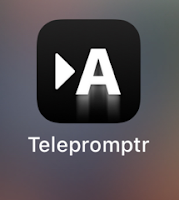
3. Teleprompter (Free): I use this app often when I’m doing Facebook lives or other filmed presentations. It allows me to upload my speech into the app as a Word document, then adjust the font size, speed of scroll, and pauses as it displays the content on my phone screen. When it’s time for my presentation, I set up my phone with its teleprompter display on a tripod directly behind my computer camera, click start, and deliver my material like a pro.

4. Word Swag (Free): The Word Swag app describes itself as “like having a graphic designer in your pocket.” This nifty tool allows you to add graphics and text to your own photos. With their templates and user-friendly steps, even the most un-artistic can create beautiful images without a computer. If you wonder how your writer friends create such lovely images, check their phones. Betcha they have Word Swag.
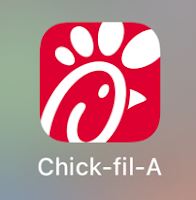
5. Chick Fil A (Free): The function of this app goes without saying. Sometimes, you just gotta have a milkshake. In my world, milkshakes (cookies and cream, no whipped cream, two cherries) can cure anything. Sad because a publishing house rejected your book proposal? Console yourself with a milkshake. Happy because you received a royalty check totaling more than ten dollars? Celebrate with a milkshake. Seeking inspiration and a reason to keep writing? Hang out at CFA, slowly sip your milkshake, observe the customers, and find endless reasons to keep writing. This world needs your words! Celebrate your renewed vision with, you guessed it, a milkshake.
Well-chosen smart phone apps put technology at our fingertips and bring value, productivity, inspiration, and joy to our writing lives.
Hopefully my short list will get you started. Please join the conversation by sharing your favorite writing-related apps in the comments below. I can’t wait to learn from you.
TWEETABLE5 Favorite Smart Phone Apps for Writers from author Lori Hatcher on @EdieMelson (Click to Tweet)
 Lori Hatcher loves to inspire and equip others by sharing high-impact stories for spiritual transformation. A popular women’s ministry speaker and writing/speaking instructor, Lori is an Advanced Communicator Gold and Advanced Leader Bronze with Toastmasters International. She writes for Our Daily Bread, Guideposts, Revive Our Hearts, and Crosswalk.com. Check out her latest devotional, A WORD FOR YOUR DAY: 66 DEVOTIONS TO REFRESH YOUR MIND, from Our Daily Bread Publishing. Connect with her at LORIHATCHER.COM or on FACEBOOK.
Lori Hatcher loves to inspire and equip others by sharing high-impact stories for spiritual transformation. A popular women’s ministry speaker and writing/speaking instructor, Lori is an Advanced Communicator Gold and Advanced Leader Bronze with Toastmasters International. She writes for Our Daily Bread, Guideposts, Revive Our Hearts, and Crosswalk.com. Check out her latest devotional, A WORD FOR YOUR DAY: 66 DEVOTIONS TO REFRESH YOUR MIND, from Our Daily Bread Publishing. Connect with her at LORIHATCHER.COM or on FACEBOOK.
Published on June 27, 2024 22:00
June 26, 2024
Discouragement Is a Choice Every Writer Can Avoid

by Henry McLaughlin @RiverBendSagas
One given in the writing world is all writers will get discouraged.
An area where I’ve been discouraged is when a story doesn’t work. My fingers are like stones on the keyboard. What seemed like a great story idea flickers like a dying fire. The plot is what my Italian friends call a frittata. The characters are flat and couldn’t inspire or engage a tree stump. The dialogue puts me to sleep and I’m writing it. And the setting has all the excitement of a square room with white walls and a bare floor. One way I deal with this is to put the story aside and write something more meaningful, like a grocery list or a to do list.
There are other areas where discouragement can raise its ugly head. Unfortunately, it’s something we do to other writers. I was at a workshop several years ago. In one session we were doing critiques. One participant said to another, “I don’t think that’s a story you should write. In fact, I don’t think you should write at all.” Shock smothered the room. It was so quiet you could hear an ant burp. The critiqued writer fought back tears. The moderator called an immediate break and took the critiquer to one side. But the damage was done. It was a long time and a lot of support before the critiqued writer returned to her story.
We’ve all heard stories of situations where a writer has been ripped to shreds by a critique, a reviewer, or an editor. No doubt I’m guilty of this myself. Why do we do this to each other?
For some, it’s jealousy. For others, it could be a need to be in control or feel superior. And for still others, it could be hiding their own inadequacies. In fact, it’s probably a combination of all these effected by other internal aspects in their psyche.
It doesn’t really matter what motivates someone to disparage or discourage another. Especially among the Christian writing community where our focus should be on representing Jesus to those striving to fulfill his call just like us.
When we’re discouraged, we actually have a choice about what to do with this awful emotion. We can let it control us and spin us out of our dreams and out of following God’s purpose.
Or we can turn to Jesus.
I’ve done that on more than one occasion. In the last the five months, I’ve been rejected by at least seven agents or publishers. Now none has said I should quit writing, but they sure haven’t been encouraging either.
Here’s what I’ve learned.
One, it’s not personal. There are a lot of writers competing for a few spots in the publishing universe. Even with self-publishing, it’s hard to get a book on the market and have it get noticed. If it is a personal attack, there may be something seriously wrong with the other person. In which case, I remove myself from their presence, physically and digitally.
Two, I dig back into the craft. Is there some nugget in the discouraging experience I can take and apply to my craft?
Three, rejection, while discouraging, can also be a step toward success, albeit a sidestep around the mulberry bush. Better than thrashing through the thorns of my own bullheadedness.
Fourth, I remember those times when I have been encouraged by a critique group, an agent, or an editor. One editor who rejected me was very kind and referred me to another publisher she thought might be a better fit.
Five, keeping all this in mind, look for opportunities to encourage others. Jesus said it best:
So in everything, do to others what you would have them do to you. Matthew 7:12 NIV
I know, we’ve heard it since we were kids. That doesn’t make it any less true.
In essence, critique others how I want to be critiqued. I submit to my critique group with the attitude that I want to be corrected and taught with kindness. I look to the group to improve my story. And this is the attitude I now take when I critique or edit someone else.
There are plenty of others in the writing universe eager to stomp on someone’s dream.
I don’t want to be one of them.
TWEETABLEDiscouragement is a Choice Every Writer Can Avoid from Henry McLaughlin (@RiverBendSagas) on @EdieMelson (Click to Tweet)
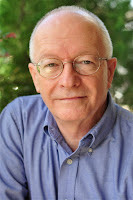 Henry’s debut novel, Journey to Riverbend, won the 2009 Operation First Novel contest.
Henry’s debut novel, Journey to Riverbend, won the 2009 Operation First Novel contest.Henry edits novels, leads critique groups, and teaches at conferences and workshops. He enjoys mentoring and coaching individual writers.
Connect with Henry on his BLOG, TWITTER and FACEBOOK.
Published on June 26, 2024 22:00
June 25, 2024
Writing A Novel’s Critical First Page
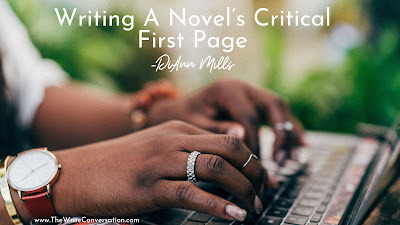
by DiAnn Mills @DiAnnMills
A novel’s first page is critical to the success of a successful novel. Here the writer must hook the reader into the story by ensuring the following are clearly shown:
1. Establish genre.2. Introduce a sympathetic character.3. Initiate a bond between the protagonist and the reader.4. Build a setting.5. Create a story disturbance.
Diving Deeper in Writing A Compelling First Page
1. A Strong Hook
Statistics show a reader decides to purchase a book by the end of the first page. I’m worse! I choose to invest time and energy into reading a book in the first paragraph and sometimes the first line.
The opening hook or first line of a novel plunges the reader into the story world by creating a curiosity or posing a question. Every story needs an alluring first sentence to entice the reader to continue. The hook is the writer’s invitation to the reader to begin an exciting journey.
“Come join me in this adventure.”
The writer issues a subtle promise to readers that every word will be as powerful as the opening line. Writers spend hours delivering on their commitment. Our opening hooks establish the essence of our story and are designed to affect reader emotions.
I like what Donald Newlove says about opening sentences in his book Painted Paragraphs. “It is about the white-hot opening whose glow speaks for a story’s greatest strength: its spirit.”
The above quote inspires me to return repeatedly to my opening line.
2. Genre
Establish the novel’s genre in the beginning: contemporary, historical, romance, suspense, fantasy, science fiction, thriller, western, young adult, or any of the other genres. Romance is often paired with other story types. The book cover and title often depict the type of story, but it’s the writer’s responsibility to establish genre on the first page.
3. A Unique and Sympathetic Hero or Heroine
Writers choose how to characterize their protagonists and antagonists in a variety of ways that suit the writer’s personality. Whatever method is used, the result is a character who lives in the reader’s heart long after the story is over. Spend time with your characters and endear them to the reader by making them come alive. The antagonist must be better equipped to succeed in reaching the goal than the protagonist.
4. An Antagonistic Setting
Ensure the setting is constantly working against the hero or heroine. Like an antagonistic character, the setting can be charming, attractive, and have an emotional impact on the character.
5. A Story Disturbance
A story disturbance is not the story problem, but a frustrating intrusion into the protagonist’s life. Some writers refer to this as the inciting incident. Introduce the disturbance on the first page and resolve it quickly. How the character responds creates a bond with the reader, who becomes the character’s cheerleader. The reader is assured that whatever problem the hero or heroine faces, the result will be an adventure.
While the above five items are critical to the first page of a novel, the writer moves forward by ensuring tension, conflict, and suspense are continuously in the character’s path. Before the first one-fifth to one-fourth of the novel, a problem is introduced, and the character chooses to accept the seemingly impossible. The character steps through the first doorway into the plot with a firm resolve to do everything possible to succeed.
A story explodes on the first page. Writers work passionately to emerge a reader into a story world that is unforgettable. Can you accept the challenge?
TWEETABLEWriting a Novel's Critical First Page from author @DiAnnMills on @EdieMelson (Click to Tweet)
 DiAnn Mills is a bestselling author who believes her readers should expect an adventure. She creates action-packed, suspense-filled novels to thrill readers. Her titles have appeared on the CBA and ECPA bestseller lists; won two Christy Awards; and been finalists for the RITA, Daphne Du Maurier, Inspirational Readers’ Choice, and Carol award contests.
DiAnn Mills is a bestselling author who believes her readers should expect an adventure. She creates action-packed, suspense-filled novels to thrill readers. Her titles have appeared on the CBA and ECPA bestseller lists; won two Christy Awards; and been finalists for the RITA, Daphne Du Maurier, Inspirational Readers’ Choice, and Carol award contests. She is the former director of the Blue Ridge Mountain Christian Writers Conference, Mountainside Marketing Retreat, and Mountainside Novelist Retreat with social media specialist Edie Melson. Connect here: DiAnnMills.com
Published on June 25, 2024 22:00
June 24, 2024
Basic Grammar for Writers—How to Use a Hyphen, En Dash, and Em Dash Correctly

by Edie Melson @EdieMelson
WARNING! Grammar nerd content ahead.
Today I'm sharing the answer to one of my personal pet peeves—the incorrect use of punctuation. But instead of a rant, I'm going to equip you to do this correctly!
I run into this issue with writers all the time—even with experienced writers. So today I’m going to give you the grammar short course and you’ll be an expert on the differences and know the best choice for every writing situation.
You may ask why it matters, but the fact is we want to be accurate when we communicate through the written word. And each of these punctuation marks carries a different meaning.
What’s the Difference?
1. A Hyphen (incorrectly referred to as a dash)
This is the shortest of the three. A hyphen is used between words or parts of words. This isn’t interchangeable with the other two types of dashes. The following are several times when a hyphen is used, but it’s not an all-inclusive list.
Examples:Hyphenate compound words:daughter-in-lawthree-year-oldsix-packHyphenate compound modifiers that work together as a single adjective:We need a baby-friendly restaurant.But don’t hyphenate words if the noun comes first:Is that restaurant baby friendly?Hyphenate numbersNumbers between twenty-one and ninety-nine should hyphenated when they’re spelled out.There are twenty-seven teenagers in the youth group.Hyphenate numbers that are the first part of a compound adjective, whether they a numerals or spelled out:My recent social media class was 60-minutes long.My son loves thirteenth-century insults.Don’t hyphenate numbers if the number is the second part of the phrase:There isn’t an exit 3 on that highway.Hyphenate words with the prefixes ALL-, Ex-, Self-That is her ex-husband.The dog chewing on the bone looked self-satisfied.
2. An En Dash
This is longer in length than a hyphen. It is used to indicate a range of numbers or a span of time. I remember it because it really is a replacement for either the words through or to.
Examples:The party was from 5:00pm–7:30pm.I read pages 25–101 in my English book.
3. An Em Dash
An em dash is the longest of these three. I remember them by knowing that the letter N is shorter than the letter M.
An em dash is used in similar circumstances to a colon, but is less formal and generates stronger emotion. It also can replace a parenthetical phrase.
Examples:Awkward: Susan loved three things: fall, coffee, and walking in the rain.Better: Susan loved three things—fall, coffee, and walking in the rain.Awkward: After waiting several seconds, the speaker continued (choosing to ignore the rude interruption).Better: After waiting several seconds, the speaker continued—choosing to ignore the rude interruption. How do I make them on my keyboard?
En Dash
To insert an EN DASH when typing on a Mac or a PC, type in this order:the wordspace single hyphenspacethe next wordspace After the last space, the hyphen will change to an EN DASH. Depending on whether you are following the AP Style guide (leave the spaces in before and after the finished en dash) or the Chicago Manual of Style (take the extra spaces out before and after the finished en dash) you will need to make your finished product CONSISTENT!
Em Dash
To insert an Em Dash when typing on a Mac or a PC, type in this order:the word NO space two hyphens without any spaces between themNO spacethe next wordspaceAfter the last space, the hyphen will change to an Em Dash.
NOTE: When tweeting or texting, all these rules go out the window. Those two forms are very casual ways of communicating and I've given up with being a grammar snob there.
Bottom Line:
This is a crash course in how to correctly use these three punctuation marks. What questions do you have about when to use them or how to create them on your computer? Leave your comments below.
Don't forget to join the conversation!Blessings,Edie Melson
TWEETABLEBasic Grammar for Writers—How to Use a Hyphen, En Dash, and Em Dash Correctly from @EdieMelson (Click to Tweet)
 Edie Melson is a woman of faith with ink-stained fingers observing life through the lens of her camera. No matter whether she’s talking to writers, entrepreneurs, or readers, her first advice is always “Find your voice, live your story.” As an author, blogger, and speaker she’s encouraged and challenged audiences across the country and around the world. Her numerous books reflect her passion to help others develop the strength of their God-given gifts and apply them to their lives.Connect with her on her website, through Facebook, Twitter and on Instagram.
Edie Melson is a woman of faith with ink-stained fingers observing life through the lens of her camera. No matter whether she’s talking to writers, entrepreneurs, or readers, her first advice is always “Find your voice, live your story.” As an author, blogger, and speaker she’s encouraged and challenged audiences across the country and around the world. Her numerous books reflect her passion to help others develop the strength of their God-given gifts and apply them to their lives.Connect with her on her website, through Facebook, Twitter and on Instagram.
Published on June 24, 2024 22:00
June 23, 2024
A Baby-Boomer Writer In a Techie’s World
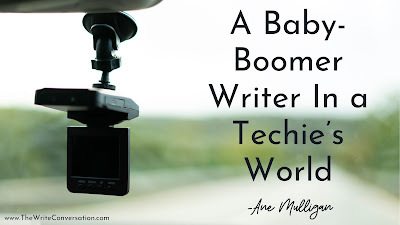
by Ane Mulligan @AneMulligan
Are drivers getting more aggressive, operating their vehicles with an attitude more appropriate for a boxing ring? Is it just me? Here is Sugar Hill, they're still friendly—not quite so aggressive. If I have someone cut me off, I figure it's somebody's relative from Atlanta.
Behavior aside, I have to scratch my head wondering if some of them got their driver's license from a Cracker Jack box. Left turns from the right lane and vice versa? We won't even talk about road rage.
Both my husband and I are careful drivers, with no tickets and only one accident each in 60+ years of driving. However, if you watch YouTube videos of those crazy accidents, you'll see not everyone is honest. And if you're an older person, people assume it's your fault. Because we are gray-headed Baby Boomers, my husband decided we each needed a dash cam in case of an accident.
He researched on Google and Amazon (the one computer activity he excels at other than online chess). He finds the one he wants, then has me take over his laptop to order it. No matter that I've shown him how to copy the url and email it to me. He can't seem or finds it too convenient to not remember. The same way he can't remember how to clear open internet tabs on his phone.
New technology intimidates.
I tend to avoid new technology. I prefer to have someone show me how to use it. I know how to use my laptop and its software, but I'd call me an intermediate user, not expert. If something goes wrong, I'm in trouble. My husband? He's light years behind me. Finding things on his computer takes him forever and usually my help.
So when the dash cam arrived, he gave it to me saying, "Go through the instructions, so you'll know how to use it." I looked at the one-inch thick 3"x4" instruction book he set in my hand.
Me? I may know my way around my computer and the internet, but this kind if technical stuff intimidates me.
After I grabbed my trusty magnifying glass—what's with instructions being written in a point-2 font?—and removed the other four foreign languages, the thing was less than 1/4" thick. Okay, that was doable.
After he and our son installed it for me, I was good. It turns on automatically. If I'm in an accident, it immediately saves the video. What more did I need to know?
I soon found out.
Apparently, the suction cup doesn't like the heat. Or cold. Or damp. Or pollen. Half the time when I go to my car, its hanging by it's connection cord. I keep water and a tack cloth to wipe both the windshield and the suction cup before reattaching it. It's very frustrating. I've even had it fall while I'm driving. I almost drove on with it dangling, but I just knew that would be the time some crazy driver would target me.
That's my biggest tech problem???
I expected to have real tech woes, like the time I reattached it and pressed something wrong, so the camera only faced the rear of my car. I'm in the car at the supermarket … without my magnifying glass to read the dang point-two font. That time, I had to get one of the young employees to read the book for me, plus push the tiny buttons on the cameras.
I eased into the computer world, starting in my early forties. This dash cam came thirty five years later and dropped on me suddenly. There was no easing into it.
I'm tempted to crazy-glue the suction cup to the windshield.
TWEETABLEA Baby-boomer Writer in a Techie's World from @AneMulligan on @EdieMelson (Click to Tweet)
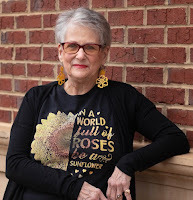 Ane Mulligan lives life from a director’s chair, both in theatre and at her desk creating novels. Entranced with story by age three, at five she saw PETER PAN onstage and was struck with a fever from which she never recovered—stage fever. One day, her passions collided, and an award-winning, bestselling novelist emerged. She believes chocolate and coffee are two of the four major food groups and lives in Sugar Hill, GA, with her artist husband and a rascally Rottweiler. Find Ane on her website, Amazon Author page, Facebook, Instagram, Pinterest, The Write Conversation, and Blue Ridge Conference Blog.
Ane Mulligan lives life from a director’s chair, both in theatre and at her desk creating novels. Entranced with story by age three, at five she saw PETER PAN onstage and was struck with a fever from which she never recovered—stage fever. One day, her passions collided, and an award-winning, bestselling novelist emerged. She believes chocolate and coffee are two of the four major food groups and lives in Sugar Hill, GA, with her artist husband and a rascally Rottweiler. Find Ane on her website, Amazon Author page, Facebook, Instagram, Pinterest, The Write Conversation, and Blue Ridge Conference Blog.
Published on June 23, 2024 22:00



